














































Inside Front Cover / Advertising

The Healthcare media range of literature is distributed to 158 Health Districts throughout the UK.
The Publications in the Healthcare media range are distributed free of charge to the general public through outlets comprising of Doctors Surgeries, Citizens Advice Bureaus, Nursing Homes, Registrars and Bereavement Services, Crematoriums, Children’s Centres, Maternity Units, Care Centres/Programmes, Hospices, Charities and NHS Clinics & Hospitals.
(Different titles are distributed to different outlets according to their readership profile - Not all titles are distributed by all outlets mentioned herewith).
The publications aim to provide invaluable advice to readers and are financed through the inclusion of relevant beneficial local advertising.
Bereavement Injury Advice
Making a Will and Funeral Planning
Older Persons Community Care Mobility Advice
Private Healthcare
Regaining Your Independence Relationship Breakdown
Sight & Hearing
Work Related Injuries & Disease / Employment Issues
Pregnancy & Parenthood
Regional GP Appointment Cards
GP Antenatal Appointment Cards
Other products in the Impact range include
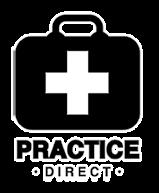

Please ask for a copy of the publications of your choice from your local range of outlets. If for any reason they do not hold stock of them please ask them to contact us or indeed feel free to contact us directly on the following links and request a copy of our publications via post or as a digital copy of any of the titles.


0115 944 7306
0115 944 0436


circulation@healthcaremedia.co.uk

www.impactonlife.com
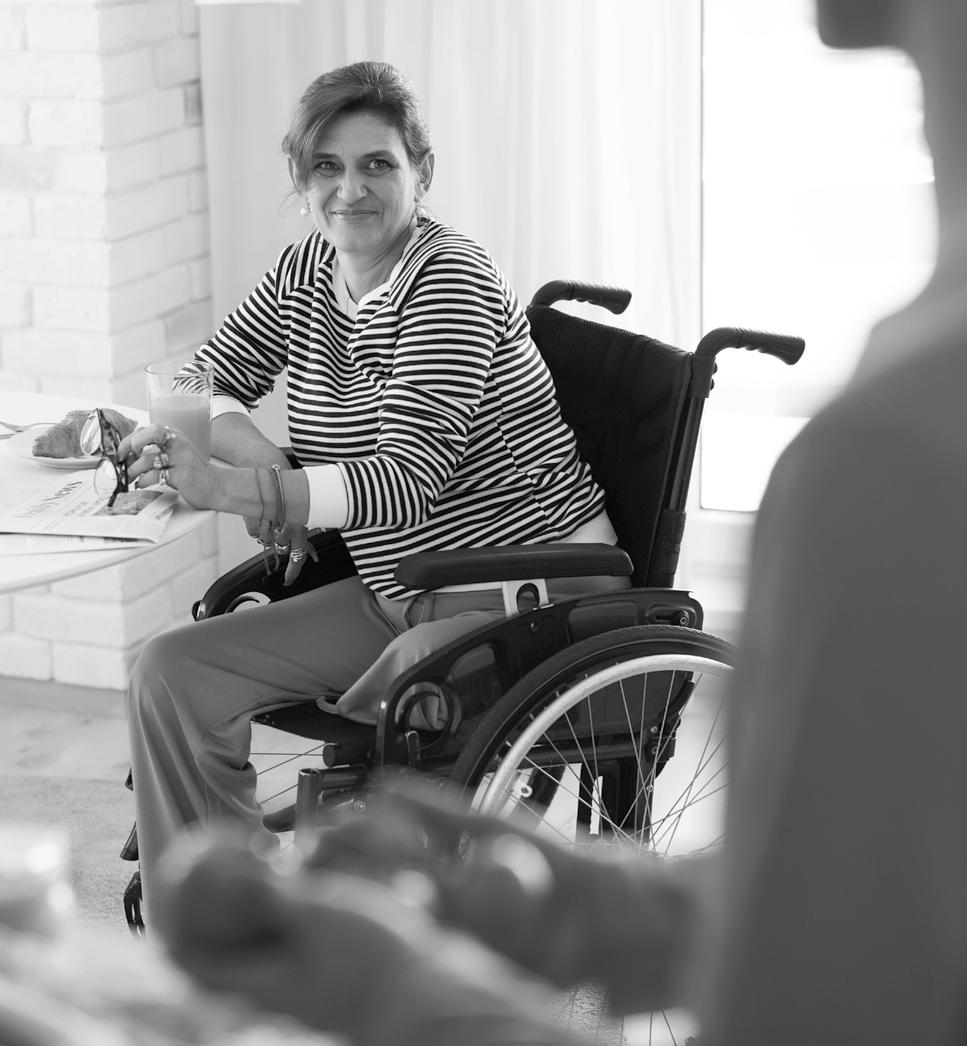
If you are someone with a temporary or permanent disability, this guide is a fantastic starting point to finding out more about ways to enjoy more independence, greater mobility and freedom. It’s packed full of information about the Motability Scheme, as well as using powered scooters, buggies, walking aids and equipment, and finding the right wheelchair for your needs.
You will also find an overview of financial support to which you may be entitled, as well as a handy list of contacts for more information.
For growing numbers of disabled people, whether still working or retired, being ‘housebound’ is not an option. Community transport services, such as Dial-a-Ride and Shopmobility schemes, and social car schemes run by voluntary organisations, can help solve some travel and shopping problems but, for many, the spontaneity and convenience afforded by the ‘private car’ is essential to leading a full active life.
Whether you want to be able to drive or simply need a practical solution to enable you to travel as a passenger in the family car, Driving Assessment and Training Centres can provide advice and information on vehicles and equipment. Medical, physical and engineering assessments are tailored to individual needs to help you achieve safe, costeffective mobility.
Centre facilities may include a computerised static assessment module (on an indoor rig) for measuring limb movement and strength, sight testing equipment, a private test track, and special vehicles catering to a variety of disabilities. Services generally include:
• Driving ability assessments
• Driving tuition in suitably adapted vehicles
• Seating and wheelchair hoisting and stowage assessments
• Vehicle appraisal and conversion
Your local Council may operate a diala-ride or taxi schemes. You may also be eligible for a bus pass for free travel.
More information about assessment and training
Driving Mobility is a network of independent organisations covering Scotland, England, Wales and Northern Ireland, which offer professional, high-quality information, advice and assessment to people who need to gain or retain independence through mobility. See www.drivingmobility.org.uk to find out more.
Any disabilities must be reported to the DVLA when applying for a licence, or when they occur if a licence is already held.
Mobility Centres can offer advice and assistance, but the decision as to whether or not a person is fit to drive rests with the DVLA.
Any vehicle that is used for a disabled person (whether they are the driver or passenger) may be exempt from road tax. To get exemption, you must be receiving either the higher rate mobility component of Child Disability Payment, enhanced rate mobility park of the Adult Disability Payment, receiving a war pensioners Mobility Supplement or Armed Forces Independence Payment.
You can get a 50% reduction in vehicle tax if you get the PIP standard rate mobility component.
The vehicle must be registered in the name of the disabled person or in the name of a driver authorised to act on your behalf (known as the nominee).
You will still need to apply for a vehicle tax, even if you don’t need to pay for vehicle tax. Before you can get your free vehicle tax, you’ll need to apply for an exemption certificate from the agency that issues your benefit. The exemption certificate will show your name and that of the nominee if you have nominated someone to drive for you. If your car is being used by the nominee or someone else for his or her personal needs, the tax exemption will be lost.
Motability Scheme is a national charity that enables disabled people to obtain a car, powered wheelchair or scooter simply by using their government-funded mobility allowances. The great thing about the scheme is that it gives you access to worry-free motoring without the financial and practical hassles of owning a car.
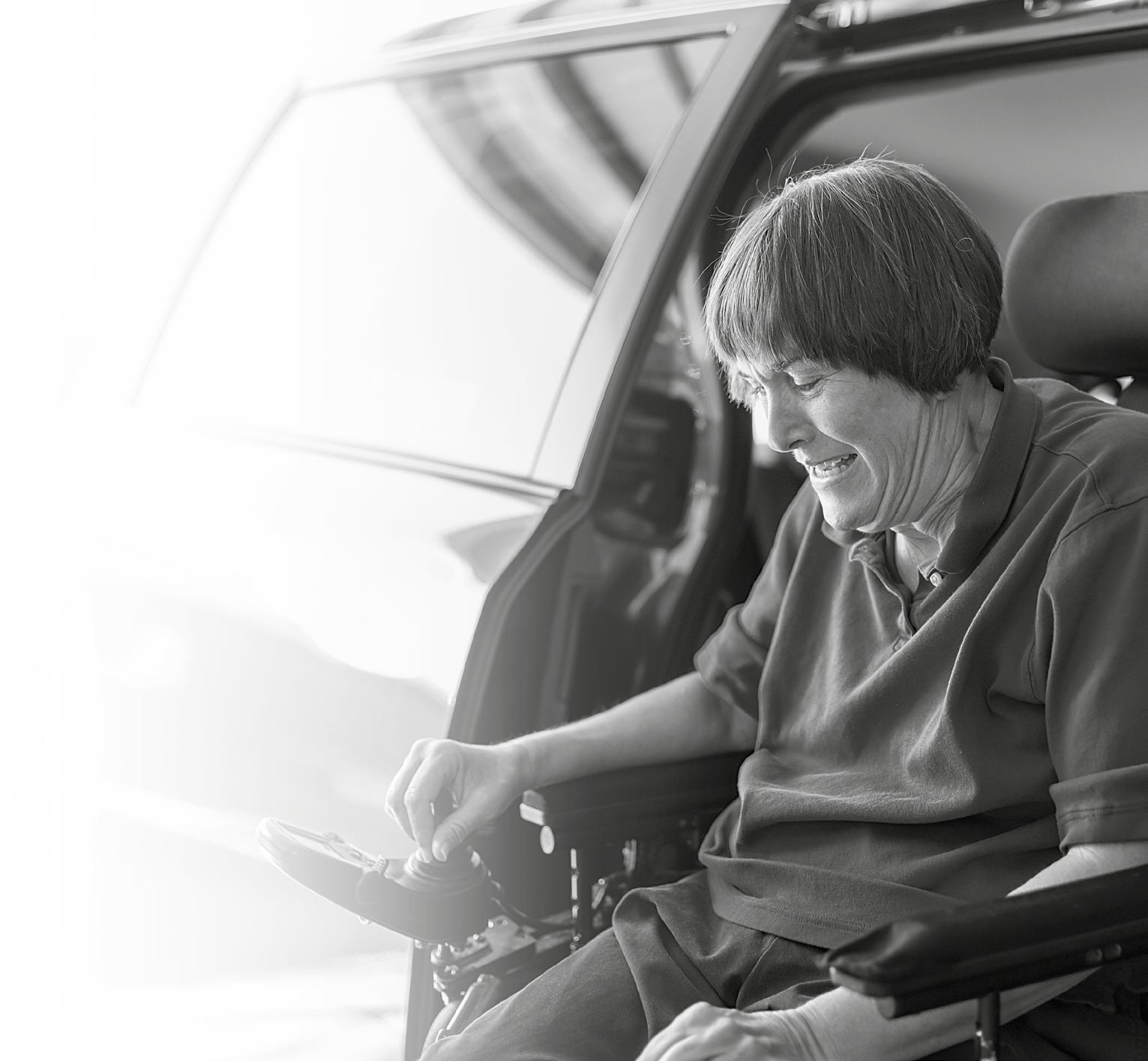

Did you know…. As of March 2025, there are currently 860,000 people across the UK enjoying the benefits of the Motability Scheme.
The following items are included in the worry-free package:
A brand-new car, powered wheelchair or scooter every three years, or wheelchair accessible vehicle (WAV) every five years
Servicing and maintenance
Full breakdown assistance
Replacement tyres (for cars, scooters and wheelchairs) and batteries (for scooters and wheelchairs)
Windscreen repair or replacement
60,000 mileage allowance over three years for cars; 100,000 for WAVs over a five-year lease
Vehicle adaptations also available, many at no extra cost
Insurance for up to three named drivers for cars and WAVs
Annual Car Tax

All cars, scooters and powered wheelchairs provided under the Motability Scheme are leased to customers by Motability Operations Ltd, who operate the scheme under contract to Motability Scheme. Both Motability Scheme and Motability Operations Ltd are authorised and regulated by the Financial Conduct Authority.
Motability Operations Ltd is a company responsible for the finance, administration and maintenance of motability cars, scooters and powered wheelchairs.
If you receive either the higher rate mobility component of Child Disability Payment, enhanced rate mobility park of the Adult Disability Payment, receiving a war pensioners Mobility Supplement (WPMS) or the Armed Forces Independence Payment (AFIP) you may be eligible to join the Motability Scheme, although you must have at least 12 months’ award length remaining.
You can get a 50% reduction in the cost of your vehicle tax if you get the standard rate mobility component of PIP.
Parents and guardians can order a car on behalf of a child aged three and above who is receiving the higher rate mobility component of DLA.
Attendance Allowance cannot be used to lease a car through the Motability Scheme
The Motability Scheme uses your mobility allowances towards funding the leasing of a car, a powered wheelchair or scooter through a local accredited dealership or premier partner.
There are over 4,500 Motability Scheme accredited dealerships across the UK and over 900 eligible models (approximately 34 car manufacturers currently involved with the Motability Scheme). The accredited dealerships prioritise disabled customers and urgent repairs, as well as providing knowledge of the Motability Scheme and wheelchair access. In fact, all of the accredited dealerships have at least one Motability Scheme specialist who can help you find the right car for your needs.
Most manufacturers offer nil or low deposits through the Motability Scheme, although offers change quarterly, so we would recommend that you liaise with your local Motability Scheme premier partner to find the best deal for your needs.
The Motability Scheme has a wide range of cars to choose from and there are three pricing options:
Cars that cost less than your mobility allowance, meaning you keep any money left over.
Cars costing the same as your mobility allowance, so that you swap your allowance for the car of your choice.
Cars that use your full mobility allowance and also require an advance payment, so you can increase your choice further by paying a one-off upfront payment.
Cars are available on a three-years lease with a mileage allowance up to 60,000.
If you find transferring from your wheelchair into a standard car and storing your wheelchair difficult, a WAV could make travelling a lot easier for you. WAVs are vehicles that have been converted by specialists so that wheelchair users can travel in them while remaining in their wheelchair, either as a passenger or a driver.
Brand new WAVs are available on a five-years lease with a mileage allowance up to 100,000. A limited number of nearly new WAVs are available on a three-year lease with a mileage allowance up to 60,000.
Nearly new WAVs come with the same all-inclusive worry-free lease package and are often a more affordable way to lease a WAV on the Motability Scheme.
A new payment was announced for people who ordered a car or WAV on or before the 3rd January 2025. If you are eligible then you will receive a oneoff payment of £750 called the New Vehicle Payment. You can choose to have this sent directly to your dealer to help towards your Advance Payment, or have this paid in full to you after you get your vehicle. If you ordered your car or WAV after the 4th January 2025 then you are not eligible for this payment.
You will receive back some money at the end of your lease, if you return your car back in good condition. When you hand your car back to the dealer, they will take photos and a brief description of the condition of the car. If your vehicle shows no sign of serios damage, you should be eligible for this payment. The amount you receive depends on the length of your agreement, but it is currently £250 for a the-year lease and £350 for a five-year lease. (You will only receive this payment if you did not request the £600 that was paid during Covid-19 to customers before the end of their lease).
Accounting for around 12% of all new cars in the UK, Motability Scheme has the power to negotiate better deals on finance, the purchase price of cars,
powered wheelchairs and scooters, insurance, breakdown recovery services and regular maintenance.
You can lease a new car from an extensive list of vehicles on a threeyear contract hire lease; a hire purchase scheme is also available. Wheelchair Accessible Vehicles (WAVs) are available to travel in as a passenger or driver on a five-year leases.
When you receive a brand new car through the Motability Scheme, it will include insurance, servicing and maintaining, full breakdown assistance, 60,000-mileage allowance over three years for standard cars (100,000 for WAVs), window and windscreen repair, tyre repair and replacement, MOT’s and road tax, a range of adaptations where needed and up to two named drivers for cars and WAVs.
Adaptations available through the Motability Scheme are designed to make your experience of driving as safe and comfortable as possible. They can help you with vehicle access, equipment loading, and driving, including steering, braking and acceleration. There are currently around 500 adaptations available, many of these are available at no extra cost when fitted at the start of your lease.
You can find a full list of available adaptations on the Motability Scheme website.
Vehicles that are specially converted so a wheelchair user can travel either as a passenger or a driver without needing to transfer out of their wheelchair.
Size, shape and design of WAVs will vary depending on the original vehicle that is used for the conversion and the company that converts it.
We would always recommend that you visit your local Motability Scheme dealership before committing to a specific car. To make the most out of your visit:
Look at the cars and WAVs section of the Motability Scheme website to see what’s available for your needs and budget
Take your mobility aids with you, so you can check the car for size and accessibility
Use Motability Schemes checklist for tips (available for download from the Motability Scheme website)
Arrange to take a test drive
Fill out the Motability Scheme Suitability Questionnaire
Find out the expected delivery time
Ask questions
f your lifestyle is more suited to short journeys and you can travel fairly independently, a scooter or powered wheelchair could help with your mobility.
There are over 500 products to choose from, ranging from small boot scooters to large road ready scooters for going longer distances and carrying heavier loads. The majority of scooters and wheelchairs cost less to lease than your allowance, so your remaining allowance is paid directly in your bank.
A new payment was announced for people who order a scooter or powered wheelchair before 3rd January 2025. If you are eligible then you will receive a one off payment of £100 called the New Product Payment, which you will receive within a few days of getting your new product.
Obtaining a Scooter or Powered Wheelchair through the Motability Scheme
It is possible to obtain a brand-new scooter or powered wheelchair on a three-year lease through the Motability Scheme (Custom-made wheelchairs are available on a fiveyear lease). You will also receive loss and damage protection for your product, insurance, breakdown assistance, tyre and battery replacement, service, maintenance and routine repairs.
The Blue Badge Scheme provides a national arrangement of on-street parking concessions enabling people with severe walking difficulties who travel as either drivers or passengers to park close to their destinations. In Scotland a charge for a Blue Badge can be up to £20.
You will automatically get a blue badge if you:
Receive the higher rate of the mobility component of Disability Living Allowance
Receive War Pensioners Mobility Supplement
Receive the Personal Independence Payment and a score of 8 points or more under the ‘moving around’ area of your assessment
Receive the Personal Independence Payment and score 12 or more points in the ‘planning and following a journey’ area of your assessment
If you are 16 or over and registered or certified blind (severely sight impaired)
Under 16 and receive a letter confirming your eligibility from your visual impairment care team
get Personal Independence Payment and used to get the higher rate of the mobility component of Disability Living Allowance on an indefinite or lifetime basis
get Personal Independence Payment, used to get the higher rate of the mobility component of Disability Living Allowance, and your Personal Independence Payment decision is being appealed
get the Adult Disability Payment and have been awarded either 8 points or more in the Moving Around activity or 12 points in the Planning and Following a Journey activity or enhanced rate mobility under the special rules for terminal illness
get the higher rate of the mobility component of Child Disability Payment
got a lump sum payment from tariffs 1 to 8 of the Armed Forces Compensation Scheme and have been certified as having a permanent and substantial disability
You may also be eligible for a Blue Badge if you:
have a substantial disability lasting at least 12 months that means you cannot walk at all
have a substantial disability lasting at least 12 months that means you’re virtually unable to walk
regularly drive and cannot use parking meters because of a severe disability in both arms
are responsible for a child under 3 years old who needs to be kept close to a vehicle for medical treatment
are responsible for a child under 3 years old who uses bulky medical equipment that cannot be carried around
have a mental condition that means you lack awareness about the danger of traffic when making journeys (you cannot apply on line for this, you must phone your local council’s Blue Badge team for a paper application form).
The Scheme is administered by local authorities who deal with applications and issue badges.
Contact your local council or authority in Scotland:
When you need an application form to apply for a badge
You need an application form to apply for a disabled parking bay
Your application was unsuccessful but you do not know why
Your badge needs to be renewed
You move house
You no longer need a badge
A badge needs to be returned because the holder has died
A badge needs to be returned when you are no longer entitled to use it
Transport Scotland has produced an explanatory booklet - ‘The Blue Badge Scheme: rights and responsibilities in Scotland’explaining the Scheme in more detail (see www.mygov.scot/bluebadge-scheme for this and other publications).
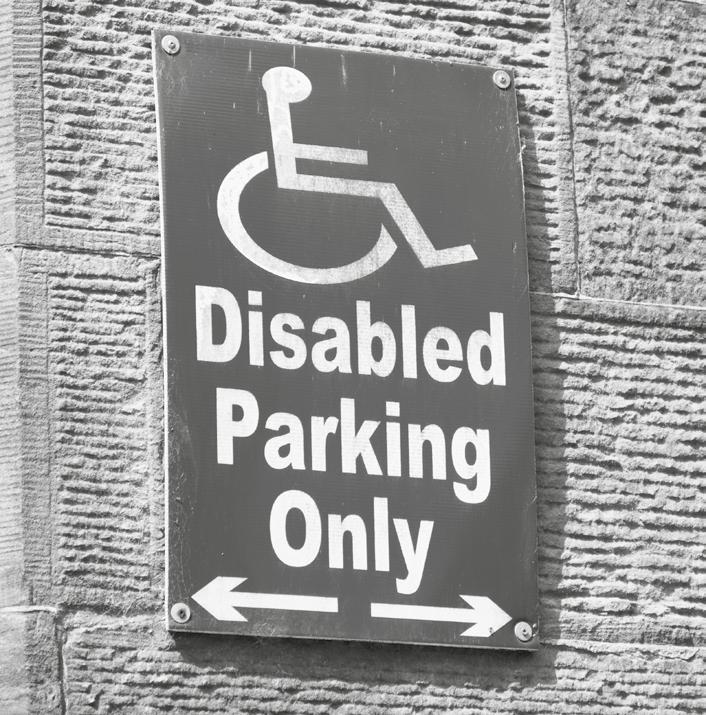
A number of battery-powered scooters or buggies are available, including small scooters that can be dismantles or folded to fit into even a small car boot. Medium scooters (class 2 or 3) are sturdier than the smaller scooters, however they are not as easy to fold. Class 2 are designed for use on pavements and only have a top speed of 4mph, class 3 have a maximum speed of 8mph.
Larger road legal scooters (Class 3) are more powerful. They can be used on pavements at up to 4mp and on roads at up to 8mph but they must be taxed. They also have to have lights, a horn, etc.

Did you know….There are 16 million disabled people in the UK, 11% of children are disabled, 23% of working age adults are disabled and 45% of pension age adults are disabled.
You do not need a driving licence or insurance to use a scooter, but personal liability insurance is recommended. You are required to register a Class 3 Scooter or wheelchair with the DVLA but will not need to show registration plates. Drivers within either class of vehicle must be disabled and aged 14 or over.
Within each category, there is a range of different models and accessories, each with their own features to meet individual needs.
Scooters and buggies look very similar, the main difference being that scooters dismantle while buggies do not.
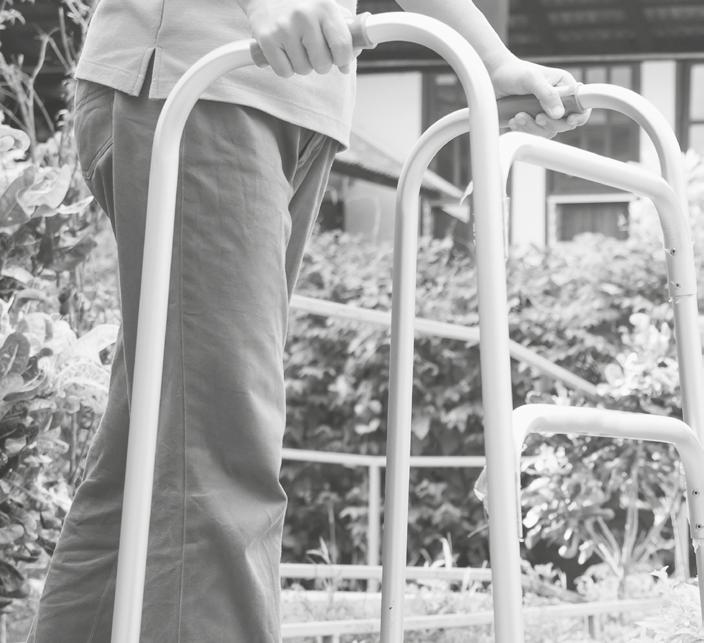
Walking equipment is generally regarded as a mobility device, and is therefore provided by a physiotherapist based at a local hospital or health centre.
Referral to a physiotherapist can be made by a range of professionals including therapists, nurses, and doctors. Provision may include walking/pulpit frames, mobile frames/rollators, crutches, walking sticks, or tripods/quadrupods.
As a rule, you should consult your GP or physiotherapist before you consider buying walking equipment privately.
Some suppliers are reluctant to provide a walking device to private individuals without a letter verifying the suitability from a physiotherapist or medical practitioner.
Walking equipment is used for two purposes: first, as part of a rehabilitation programme when the user is recovering from an injury or operation, and second: as a longterm aid to mobility when the user has a permanent difficulty with walking.If you need temporary help in getting around, the NHS can provide ‘personal mobility aids’ such as walking sticks, zimmer frames, crutches and other aids on shortterm loan. The NHS is not allowed to charge for equipment, but you may be asked to pay a returnable deposit in some instances.
If your needs are more long-term, you should ask to be assessed by a physiotherapist through your local social services department. The physiotherapist will also be able to give you more information about charities and private organisations selling mobility aids.
Before buying, try to see and use the equipment to check that it suits your needs. The Disabled Living Centres around the country have a wide range of equipment on display and all can give advice and information on walking equipment.

In Scotland there are five wheelchair and seating services (WSS) that provide multidisciplinary assessment and provision to wheelchair users and carers, these are based in Inverness, Aberdeen, Dundee, Edinburgh and Glasgow. This service is available to anybody who has a long-term disability that affects their ability to walk and you must be referred to the service by a qualified healthcare professional, such as a GP, District Nurse, Physiotherapist or Occupational Therapist. The clinical assessment can be provided at either their local clinic or at the patients home.
WSS offer a vital service in providing technological assistance for enabling users and their carers to live a full and healthy life. Each centre offers recourses where people can have a specialist assessment and fitting for wheelchairs and special wheelchair seating systems. These centres also manage the provisions and delivery of the equipment and operate repairs and maintenance for the NHS wheelchairs they provide.

A range of wheelchairs are available to provide you with greater comfort and safety with maximum mobility, making you less reliant, where possible, on carers and home help.
There are four main ways of getting a wheelchair:
• Short-term loan - usually, when you will need a wheelchair for less than six months, you would like to try a wheelchair before you buy one or you are waiting for an assessment with your local Wheelchair and Seating Service
• Long-term loan – when you are likely to need a wheelchair for more than six months
• Buying a new or second-hand wheelchair
• Hiring a wheelchair
Did you know…. The majority of wheelchair users are aged 60 or more, they account for more than two thirds of all wheelchair users in the UK.
Once your need for a wheelchair has been identified, regardless of whether your disability is temporary or permanent, a variety of healthcare professionals including occupational therapists, physiotherapists, other allied health professional, nurses, GPs and hospital medical consultants can refer you to a Wheelchair and Seating Services centre. They may simply indicate on the referral from that a standard wheelchair is required or they may ask for a more detailed assessment of your needs.
The Wheelchair and Seating Service staff have the specialist skills and knowledge needed to assess people who may have additional needs or require more complex technological solutions for their mobility and seating requirements.
The way the Wheelchair and Seating Service is currently organised and provided varies across Scotland. This can affect the type of wheelchairyou are offered (if any) as well as the timescale in which it will be provided and the way it is funded. Normally, NHS wheelchairs are available on loan; various terms and conditions may apply to your loan, such as receiving a wheelchair for indoor or short-term use only.
If you feel that the chair provided by your wheelchair service does not meet your needs, you can ask to be re-assessed by another WSS centre in Scotland or to have the decision reviewed by your local NHS Health Board. If you still feel that the chairs offered are not what you want, then you have the option to buy or rent a privately funded chair. You should be aware that there could be long waiting lists for assessment through the Wheelchair and Seating Service, as well as strict eligibility criteria, which varies from region to region.
While you’re waiting, you may want to ask your GP whether they have a wheelchair loan system or contact the British Red Cross, which offers short-term support and products for independent living and may be able to provide you with a wheelchair on a short-term basis.

Once your GP, occupational therapist or physiotherapist has referred you to the wheelchair service, your exact needs will be assessed. The assessment may be carried out in your own home, at a clinic or in hospital, as well as at the service’s own centre, depending on your situation.
You will be assessed by a professional qualified in wheelchair assessment, such as an occupational therapist, who will possibly work with a rehabilitation engineer.
The engineer will be able to make refinements, adjustments or modifications to wheelchairs to be sure that you get the chair that is right for you. For instance, you may have particular needs for special seating or for pressure-relieving cushions.
Where necessary, a specialist team can provide assessments if you have severe physical disabilities which make it difficult to use a standard wheelchair or controls. If your child needs a wheelchair, their assessment may include other professionals across the health, education and social services to ensure that the wheelchair can be used at school, on transport or for social activities. As a child’s parent or carer, you should be part of the assessment process and consulted on your views and opinions.
The NHS does everything possible to tailor wheelchairs to the needs of users. The best way to find out what type of wheelchair you need is to use one over a few weeks for your normal activities, such as getting around at home or in and out of the car.
You may be able to borrow a wheelchair on a trial basis, although this may vary according to which NHS Integration Joint Boards you come under.
Usually, the NHS Wheelchair Service does not cover electric outdoor wheelchairs, electric scooters or specialist sports wheelchairs, for example, and you will probably have to buy these privately.
It may be possible to arrange the loan of more than one wheelchair if it is necessary, for example, one for using at home and the other for use at work.
There are three different types of wheelchairs:
• Self-propelled – controlled by user
• Attendant-propelled – steered by someone else
• Electric powered – class 2 for pavement use and Class 3 for pavement and road use
With powered wheelchairs, a careful assessment is made with regard to safety and suitability as users must be fully competent to operate them without accident or injury.
There are strict rules about the supply of indoor/outdoor chairs. These are only provided to people who need them and who are not able to use a manual chair. There may also be a long delay before one can be supplied.
The NHS does not provide battery powered scooters or buggies.
When your wheelchair is ready, it will be formally handed over to you with an explanation about how to use it (including safety issues), the relevant documentation and a point of contact for future enquiries, guidance on transporting your wheelchair on private and public transport, as well as information regarding conditions of supply, insurance, repairs and maintenance (including details of who is responsible for this).

Did you know….Wheelchairs are used by an estimated 1.2 million people in the UK.
Your local wheelchair service centre may be able to offer advice to you or a relative/carer on loading your wheelchair into a car or other vehicle. They can also advise you on ways in which you can travel in a vehicle whilst in your chair, if necessary.
You may only need a wheelchair for a limited period, perhaps because of an accident or other circumstances. In such cases.
The Scottish Government introduced new measures for people who live in Scotland and need a wheelchair for the short term use, they will receive one from their local Health and Social Care partnership and referrals will be quicker and wheelchairs will be free.
The British Red Cross also provides wheelchairs and other equipment on a temporary basis through its short-term support for independent living. You can buy equipment from the British Red Cross mobility range; this includes walkers, shoppers, walking frames, walking sticks and wheelchairs.
You can find more details about the service at www.redcross.org.uk
If you are not eligible for an NHS wheelchair or you are unhappy with the chairs you have been offered, you can choose to rent or buy a wheelchair yourself. Voluntary organisations and charities such as the British Red Cross or Shopmobility may work in partnership with NHS Wheelchair Services to provide a greater choice of wheelchairs. You may also choose to rent or buy through a private company.
Before buying, it is advisable to consult one of the trade associations that monitor its members’ products and practices. One such association is the British Healthcare Trades Association (BHTA) represents over 400 companies in the healthcare and assistive technology industry. (see Useful Contacts/Organisations Section for contact details). The BHTA can provide information about mobility vehicle distributors as well as other useful information. They currently publish a series of free ‘Get Wise’ leaflets that may be of particular interest when choosing mobility options.
It is worth noting that there are organisations that provide wheelchair skills for people of all ages.
local Wheelchair and Seating
Your local NHS health board can give you details of your appointed Wheelchair and Seating Services Centre or a suitable local centre. Alternatively, you can call NHS 24 free on 111 or visit the website www. nhs24.scot for links to information about your local NHS services.
If you use or need to use a wheelchair, are looking for work or are in work and having difficulties in relation to your disability, you should contact your local Jobcentre Plus Office and ask to speak to a Disability Employment Advisor (DEA).
The DEA will be able to give you advice about:
• Equipment you need for the workplace such as lightweight, powered or elevated wheelchairs
• Adaptations to the premises if possible
• Information about job vacancies and employer advocacy
• Providing a support worker in the work place
They will also be able to tell you more about the ‘Access to Work Scheme’, which you may find useful (see www.gov.uk for more information about ‘Access to Work’).
If you have problems with your mobility, you may need help with some of your daily activities, such as doing your cleaning, shopping or driving, as well as personal care like washing or using the toilet.
Homecare is often the first choice for people who need help to lead an independent life because the level of care provided is flexible and can enable you to stay in the comfort and security of your own home. Before you begin to consider finding help, it is essential that you receive a Community Care Assessment. Your local authority arranges these, so you will need to approach its Social Care Department in the first instance. A specialist, often an occupational therapist, will visit you at home to assess your individual needs. It could be that your needs vary but even if they are visiting you on a good day, it’s important you bring to their attention all the practical tasks you find difficult to do without help. How this assessment is carried out depends on the arrangement in operation in your area.
Whatever arrangements are put in place, they will be reviewed, generally after three months, then on a yearly basis. In addition to Homecare services accessed through your local authority, there are a number of private Homecare agencies.
It is best to explore all of your options carefully, contacting your local authority in the first instance, or organisations such as the Homecare Association (www. homecareassociation.org.uk) or the Care Inspectorate in Scotland. (www.careinspectorate.com).
The aim of homecare agencies is to provide care services that enable people to maintain their personal independence, comfort and contact with their local community within their own home. The level and type of care you receive can range from a small amount of support (half an hour a week) to several hours a day, or even 24-hour live-in care, depending on your individual circumstances. You can engage the services of a homecare agency on a temporary basis, intermittently or long-term.
Homecare agencies can typically provide carers who are able to give you practical support with your daily chores, such as cleaning, shopping, banking or paying bills. They may also provide a sitting service or help with preparing your meals.
You can request carers trained to give personal care, such as help with going to the toilet, bathing or dressing, as well as carers who can perform medical tasks, such as administering your medication, giving injections or changing a catheter.
A homecare agency usually has carers who are able to drive for you or provide you with help getting around.
You can arrange for a carer to come into your home at specific times, for example, to help you get out of bed in the morning or go to bed at night, or to accompany you to a hospital or doctor’s appointment.
Homecare agencies are strictly regulated, and homecare workers are required to undergo initial training to make sure that they are able to provide a good standard of care in a person’s home. Many care workers go on to achieve further recognised qualifications in care. In the UK, all homecare workers are required to undergo a criminal record disclosure.
Homecare agencies are required to register with their statutory regulator if they provide personal care, and will be expected to undergo regular inspection. These agencies are also required to comply fully with health and safety legislation in order to identify and minimise risks to people receiving care.
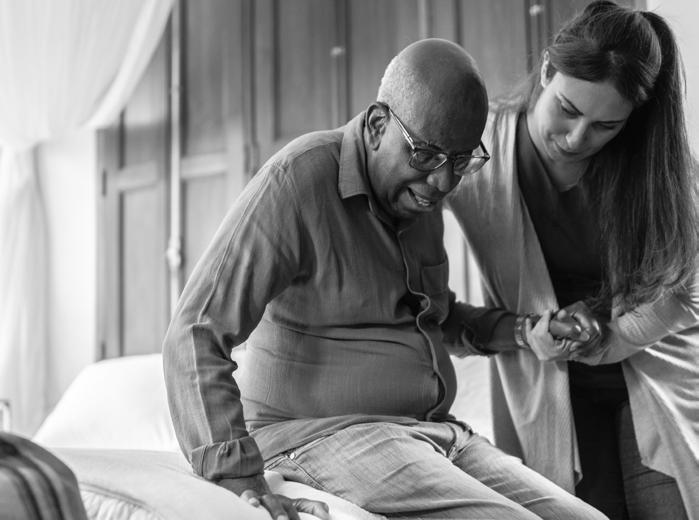
What happens after you receive an assessment?
Once you have an agreed assessment, you have three ways of arranging homecare (sometimes called home support or home help).
1
Your local council provides the carer, in which case everything is arranged for you.
2
You ask an agency to find you the appropriate carer. You still have to find the agency but all you need to do after that is pay the agency.
3
You find your own carer. This gives you flexibility, but also more responsibility since you become the carer’s employer.
The system of direct payments now in operation allows you independence in using methods two or three but does involve more responsibility and work for you or your family.
How can you find the right agency for you?
All carers and homecare agencies in the UK have to be registered. You can find details of appropriate agencies on the following websites: Care Inspectorate (www.careinspectorate.com)
Homecare Association (www.homecareassociation.org.uk)
The Care Inspectorate carry out an inspection programme of all agencies offering homecare services.
How can I find my own carer?
To find your own individual carer, you can place advertisements in shops, supermarkets, voluntary organisations, local Jobcentres or newspapers. Help in drawing up advertisements and considering all the implications of employing your own carer is available on the Gov website (www.gov.uk). In particular, they draw attention to the implications of Tax and National Insurance and Employers Liability Insurance. You can also ask your local social services department to help you with the paperwork.
You can find a guide to drawing up an employment contract on the Gov website (http://www.gov. uk/employment-contracts-andconditions).
AGE UK publishes a useful factsheet (No 46, Paying for care and support at home) on their website (last updated May 2025).

Councils vary in what they will fund and individual circumstances can produce different results in what the financial cost is to the user.
It is difficult to be exact in offering you a guide to what care will cost you but charges can range between £23 and £34 per hour depending on your area, agency or needs.
People aged 65 and over are eligible for free personal care if they have been assessed as required by their local authority and can no longer be charged by local authorities for such services in their own homes, although may be charged for domestic services.
If you are worried about having an accident or falling ill while you are in your own home alone, community alarms provide emergency access that is staffed 24 hours a day, 365 days a year.
Did you know….. Lots of other attractions such as museums, zoos and National Trust sites offer discounts for carers but don’t advertise them; it’s always worth giving the venue a ring and asking before you go.
Social healthcare is a very complex subject. Individual needs can vary across a wide range.
The community alarm is connected to your telephone line and can be activated via a pendant worn around the neck or a wrist band. They provide reassurance to your family and friends that help, if needed, is only a touch of a button away. Telecare systems are a range of simple sensors that either raise an alarm or act as a reminder to help to keep you safe and independent in your own home, they include items such as: door sensors, movement sensors, medication reminders and smoke, gas or flood detectors.
The housing department of your local council, Age UK and private companies provide this valuable service.

As someone with a disability or illness (physical or mental) that restricts your mobility, you may be able to claim one or more of the benefits and entitlements. Although this will depend on your individual circumstances. To find out more, we would suggest looking at the Gov website (www.gov.uk).

Did you know…..Disability prevalence increases with age. Nearly 80% of older adults aged 85 or more are disabled.
The Scottish Government has established that Social Security Scotland will administer certain benefits. These benefits are the Adult Disability Payment, which has replaced Personal Independent Payment and Child Disability Payment, which has replaced Disability Living Allowance for young people.
For more information visit www.mygov.scot/contact-socialsecurity-scotland/
Social Security Scotland have introduced a new allowance called Adult Disability Payment which has replaced Disability Living Allowance for disabled people living in Scotland aged between 16 years and state pension age and Child Disability Payment for a disabled child who lives in Scotland and is under the age of 16. You will keep getting your regular DLA payment until your payment moves. there will be no gaps in your payment. The Department of Work and Pension will contact you when it is time to move, you will also receive a letter from Social Security Scotland telling you what will happen during the move. Your Adult Disability Payment or Child Disability Payment award will start the day after your DLA award ends.
Social Security Scotland has introduced a new allowance called Adult Disability Payment which will gradually replace Personal Independence Payment. This will happen in phases, but everyone in Scotland who claims PIP will be moved over to Adult Disability Payment by the end of 2025. The payment will be the same amount as PIP and you will be paid on the same day, there will be no gaps in payment during your move. The Department of Work and Pension will contact you when it is time to move, you will also receive a letter from Social Security Scotland telling you what will happen during the move. Your Adult Disability Payment will start the day after your PIP award ends.
Adult Disability Payment will gradually replace Personal Independent Payment. Adult Disability Payment It is a benefit for people between 16 years and state pension age and who are living with a long-term illness or disability (either physical or mental). This payment is made up of 2 parts, Daily Living and Mobility. You may quality for either one or both parts. Each part is made up of two different awards – standard and enhanced award.
The Daily Living award takes into account how much care you need (regardless of whether you are actually receiving it). There are different criteria for establishing which award you should receive. If you are terminally ill you will automatically get the enhanced daily living award.

Did you know….Some 5.53 million disabled people are in work.
The Mobility award considers what help you may need to be mobile and looks at whether you need someone to provide guidance or supervision when you are outside on unfamiliar routes or whether you have severe mobility problems. |f you are entitled to the enhanced award then you can apply to lease an accessible vehicle.
Adult Disability Payment is currently paid at the following rates (correct as of April 2025)
Social Security Scotland has introduced a new allowance called Child Disability Allowance and is for children under 16 years old and who live in Scotland. This payment will gradually replace Disability Living Allowance for children and young people living in Scotland. This payment is tax-free and provides support for costs that a disabled child might have and it is made up of 2 components, Care and Mobility. The Care components is made up of three rates and the Mobility Components is made up of two rates. If you qualify for the higher rate Mobility component then you can apply to lease an accessible vehicle and if you receive the higher rate of Care component then you will also get Child Winter Heating Assistance.
Child Disability Payment is currently paid at the following rates (correct as of April 2025)
The Scottish government have voted to change the definition of ‘terminal illness’ for the purpose of claiming benefits. This should now give people living with a terminal illness, faster, and easier, access to certain benefits such as Adult Disability Payment and Child Disability Payment.
So applying for benefits under the Special Rules for Terminal Illness means that you will no longer have to fill in a long claims form and avoid face to face assessments and so should receive their benefits quicker. Other help
You or your carer might also qualify for other financial help, for example Carers Allowance, or help with housing or transport costs
Attendance Allowance is a tax-free benefit for people over state pension age who have specific care needs because of an illness or disability (either physical or mental).
This benefit looks at the amount of care you need, regardless of whether you are actually receiving that care or not, and is not means-tested.
To be eligible for Attendance Allowance, your care should include the following:
• Frequent attention during the day in connection with your bodily functions
• Or continual supervision during the day in order to prevent substantial danger to yourself or others
• Or the need for prolonged or repeated attention during the night in connection to your bodily functions
• Or being watched for much of the night
You can claim Attendance Allowance if you have needed looking after for at least six months (this qualifying period is waived if you are terminally ill).
The care help you need should cover things like bathing, eating, going to the toilet and getting dressed. It can also include help with medical treatment (e.g., administering tablets or injections, or using a kidney dialysis machine). Attendance Allowance takes into account supervision that you might need because of dizzy spells, falls or seizures.
Attendance Allowance is tax-free and paid at two rates (depending on whether you need care during the day, night, or both). The rates usually increase every April (correct as of April 2025)
Higher rate £110.40 per week
Lower rate £73.90 per week
If you receive Attendance Allowance, you may also be entitled to extra Pension Credit, Housing Benefit or Council Tax Reduction.
Your carer could also get Carers Allowance if you have substantial caring needs.
You may be entitled to receive Industrial Injuries Disablement Benefit (accidents) if you are ill or disabled because of an accident or event that happened in connection with work. The amount you may receive will depend on your individual circumstances (e.g., your age and the assessed level of your disability). If you are awarded Industrial Injuries Disablement Benefit, this may affect the other benefits you receive.
There is also an Industrial Injuries Disablement Benefit (diseases), which covers more than 70 diseases that can be caused by certain types of work. The amount you get depends on your individual circumstances.
You may be able to claim War Disablement Pension under the War Pensions Scheme if you were injured or disabled as a result of service in Her Majesty’s (HM) Armed Forces, you are no longer serving in HM Armed Forces and the claimed condition was caused by service before 6 April 2005.
Claims for disablement that occurred on or after 6 April 2005 should be made under the Armed Forces Compensation Scheme.
The amount you receive will depend on the assessed level of your disability.
Armed Forces Independence Payment
The AFIP is an additional allowance that provides financial support for service personnel and veterans seriously injured as a result of service to cover the extra costs they may have as a result of their injury on or after 6th April 2005.
AFIP is an alternative payment to PIP or DLA. (You cannot get both at the same time).
To be eligible for AFIP you must be entitle to a Guarantee Income Payment (GIP) of 50% or higher through the Armed Forces Compensation Scheme.
For more information, visit Veterans UK at www.gov.uk/government/ organisations/veterans-uk.
If you need daily care and attention because of a disability and you claim Industrial Injuries Disablement Benefit or a War Disablement Pension, you can claim Constant Attendance Allowance (CAA).
The criteria you need to fulfil to receive CAA will depend on which of these two benefits you receive.
There are four different rates of Constant Attendance Allowance and it is paid at the following weekly rates (correct as of April 2025) Exceptional rate
If you get the ‘exceptional rate’ or ‘intermediate rate’, you may also get Exceptionally Severe Disablement Allowance.
Social Security Scotland have introduced a new benefit called Carer Support Payment which will be replacing Carers Allowance for people who live in Scotland.
If you currently receive Carer’s Allowance, you do not need to apply for Carer Support Payment as the DWP and Social Security Scotland will move your benefit for you. The amount you will receive will be the same as Carers Allowance.
You may also be eligible for Carer’s Allowance Supplement. This is an extra payment for people who live in Scotland and who get Carer Support Payment or Carer’s Allowance o a particular date. The Carer’s Allowance Supplement is paid 2 times a year.
If you are caring for an ill or disabled person in their home for more than 35 hours a week, you may be entitled to claim Carers’ Allowance. However, it is worth being aware that Carers’ Allowance can cause other benefits to increase or decrease, and may affect the benefits of the person for whom you are caring.
You can claim for carers allowance if the person you care for is claiming one of these benefits:
• Personal Independence Paymentdaily living component.
• Disability Living Allowance - the middle or highest care rate.
• Attendance Allowance.
• Constant Attendance Allowance at or above the normal maximum rate with an Industrial Injuries Disablement Benefit.
• Attendance Allowance.
• Constant Attendance Allowance at or above the normal maximum rate with an Industrial Injuries Disablement Benefit.
• Constant Attendance Allowance at the basic (full day) rate with a War Disablement Pension.
• Armed Forces Independence Payment.
You may be able to get Carer’s Allowance if all of the following apply:
• You’re 16 or over.
• You spend at least 35 hours a week caring for someone.
• You’ve been in England, Scotland or Wales for at least 2 of the last 3 years (this doesn’t apply if you’re a refugee or have humanitarian protection status).
• You normally live in England, Scotland or Wales, or you live abroad as a member of the armed forces. (you might still be eligible if you’re moving to or already living in an EEA country or Switzerland).
• You’re not in full-time education.
• You’re not studying for 21 hours a week or more.
• your earnings are £196 or less a week after tax, National Insurance and expenses
• You are not subject to immigration control.
Carers Allowance is a taxable benefit, currently paid at a rate of £83.30 per week (April 2025).


Did you know…..Over 50% of people think of disability as a physical impairment.
As mentioned earlier in this guide, financial assistance towards your health and independent living may be available in the form of Direct Payments, Value Added Tax relief on equipment and services, equipment for independent living and Disabled Facilities Grants (available through your local authority).
You may also be entitled to help towards health costs such as free NHS prescriptions, dental care, hospital travel costs, wheelchairs and hearing aids.
You may be able to arrange a reduction in your Council Tax Bill. If you are on a low income or claim benefits.
If you are on a low income and paying rent, you may be entitled to claim Housing Benefit towards your rent.
If you are registered blind, you are entitled to a 50% reduction on the cost of a TV licence.

Did you know…..Disability is more likely to affect older adults over State Pension age. They account for 45% of the disabled in the UK compared to 16% of working age adults and 6% children.
If you have a long-term illness or you are disabled, you may not have to pay VAT on cars and other equipment designed to help your mobility. People aged 60 and over may be able to pay a lower rate of VAT on mobility aids installed in their home. The rules regarding VAT are complicated; therefore, we would suggest that you contact HM Revenue and Customs (see Useful Contacts/Organisations Section for contact details) for more advice about VAT exemption applicable to your individual circumstances.
No one wants to think about how and when they will die, or what it will be like for our families without us. Although planning your funeral in advance may not be something you want to think about, there are many practical and emotional reasons why it should be a priority.
Funerals are expensive occasions and require many decisions to ensure they run smoothly. Planning your funeral long in advance of it happening can give your friends and family peace of mind at a heartbreaking time.
Taking out a ‘pre-paid’ or ‘prepayment’ funeral plan enables you to let your friends and family know what you want for your funeral. It also means that the costs are covered in advance, thereby saving your family from potential financial difficulty at an already stressful time.
The Financial Conduct Authority regulate firms that provide and arrange prepaid funeral plans. This means that your money is safe with an authorised provider and you are protected by the Financial Services Compensation Scheme should your plan provider fail and if you have a complaint against a funeral plan provider or intermediary you can refer it to the Financial Ombudsman Service.


Listed below are a number of organisations that will be able to give you more advice about meeting your mobility requirements. This is by no means an exhaustive list and you may find that there are local organisations who can tell you more about the services on offer in your area.
If you are living in England or Wales , you are advised to read our English or Welsh edition of the Mobility Advice guide as many of the organisations listed below have a dedicated English or Walsh branch, and different rules, regulations and legislation may apply.
Causewayside House, 160 Causewayside, Edinburgh, EH9 1PR
Age Scotland is dedicated to helping everyone make the most of later ife. The Charity produces a number of factsheets covering a range of issues including housing, social care and legal advice. Age Scotland publications are free to older people and appropriate older people’s servicessubject to availability.

Helpline: 0800 12 44 222 Mon- Fri 9am - 5pm
Email via the online contact form www.agescotland.org.uk
We also provide telephone friendship for the over 60s.
Organises daily, weekly or occasional calls to the elderly living alone.
Red Cross
UK Office, 44 Moorfields, London EC2Y 9AL
British Red Cross branches have a supply of products for loan to aid independent living.
General Enquiries: 0344 871 11 11
Support Line: 0808 196 3651 Textphone 020 7562 2050
Email: contactus@redcross.org.uk www.redcross.org.uk Facebook/X @BritishRedCross
Tower Bridge Business Centre, 46-48 East Smithfield, London E1W 1AW
Bringing industry together to shape and improve the health and care for all.
Tel: 020 7702 2141
Email: info@bhta.com www.bhta.com
Compass House, 11 Riverside Drive, Dundee DD1 4NY
Tel: 0345 600 9527 Mon - Fri 9am - 4pm
Email: enquiries@careinspectorate.com www.careinspectorate.com
Suit 1B, 38 Queen Street, Glasgow G1 3DX
Carers Scotland is part of Carers UK and offers advice and support for carers. You are a career if you look after a relative, friend or neighbour because they are frail, ill or have a disability.
Advice line: 0808 808 7777 Mon – Fri 9am – 6pm

Email: Via the online contact form www.carerscotland.org Facebook/X
The service provides free, independent, confidential and impartial advice to everyone on their rights and responsibilities. It values diversity, promotes equality and challenges discrimination.
Scottish Citizens Advice Helpline: 0800 028 1456
To find your local citizens advice bureau, please visit their website at www.cas.org.uk Facebook/X @citizensadvicescotland

91 Princess Street, Manchester, M1 4HT
UK’s only specialist advice and support service to groups and organisations delivering community-led transport in the UK.
Great Minster House
33 Horseferry Road London SW1P 4DR
Folly Farm, Upgate Street, Carleton Rode. Norfolk, NR16 1NJ
Supporting disabled drivers, passengers and blue badge holders.
Help with assisted driving, accessibility and independent living. To find your nearest mobility centre visit their website
General Enquiries: 0161 351 1475 or email: info@ctauk.org Advice Services: 0345 130 6195 or email: advice@ctuk.org www.ctauk.org
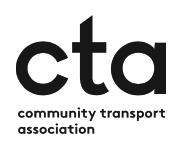
Switchboard: 0300 330 3000 (8.30am – 5.30pm)
Email Via the online contact form www.gov.uk/government/organisations/ department-for-transport
Tel: 01508 489 449
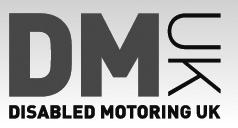
Email: info@disabledmotoring.org www.disabledmotoring.org
Tel: 0800 559 3636
Email: info@drivingmobility.org.uk www.drivingmobility.org.uk
Benefits and financial support if you are disabled or have a health condition.
HM Revenue & Customs
Homecare Association Mercury Way, 117 Waterloo Road, London, SE1 8UL
The Homecare Association is the UK’s membership body for homecare providers. Together we ensure that homecare is valued so that all of us can live well at home and flourish within our communities.
At Switchboard we provide information, support and referral service for lesbians, gay men and bisexual and trans people – and anyone considering issues around their sexuality and/or gender identity.
Impartial help, advice and information about daily living equipment, disability equipment, mobility and independent living aids for older people, disabled adults or children, their family and carers.
www.gov.uk/financial-help-disabled
www.gov.uk/government/organisations/ hm-revenue-customs
Helpline: 020 8661 8188

Email: enquiries@homecareassociation.co.uk www.homecareassociaiton.org.uk
Tel: 0800 0119 100 Open 10am - 10pm every day
Email: hello@switchboard.lgbt www.switchboard.lgbt
www.livingmadeeasy.org.uk
MACS is an advisory committee to the Scottish Government and represents the transport needs of disabled people in Scotland. Although it cannot take up individual complaints, it can pass on information about problems with public transport experienced by people with disabilities.
Tel: 0141 272 7100
Email: info@transport.gov.scot www.transport.gov.scot
The Motability Scheme enables disabled people to use their government-funded mobility allowance to lease a new car, scooter or powered wheelchair. As a registered charity (No. 299745), Motability Scheme also raises funds and provides financial assistance to those who may otherwise be unable to afford the mobility solutions they need.

Explore their website to see answers to common questions that you may have about the Motability Scheme services.
www.motability.co.uk
Write to: PO Box 7044 Tadley, Hampshire, RG24 4PL
Mobility Trust provides powered wheelchairs and scooters for UK residents who have severe disabilities and who cannot obtain such equipment through other means.
Registered Charity number: 1070975
Tel: 0118 984 2588
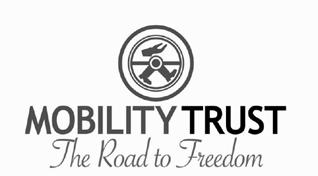
Email: mobility@mobilitytrust.org.uk www.mobilitytrust.org.uk
www.nhs24.com
Scotland’s National Telehealth and Telecare organisation 111 (Non-emergency)
Mobility Services offers practical advice, assessment and training for those wishing to drive or increase their mobility through assistive technology, personal mobility vehicles and adapted cars. We also offer courses for driving instructors to increase their skills training people with disabilities. Additionally, there is the Try b4u Fly support service specially created to reduce the anxieties and stress that can be associated with air travel by offering assessments to work out the best aeroplane support seating and transfer options for children, young people and adults with disabilities.
RiDC is a specialist UK consumer research and information charity that focuses on work with older and disabled people. RiDC is accredited under The Information Standard, a Department of Health scheme to help the public identify trustworthy health and social care information easily.
RiDC has free motoring guides available in print:
• Choosing a car • Cars for families of disabled children • Getting in and out of a car
• Getting a wheelchair into a car • Car controls
• Wheelchair accessible vehicles
Royal National Institute for the Blind (RNIB)
12-14 Hillside Crescent, Edinburgh EH7 5EA
Supporting people with sight loss.

Tel: 01372 841100
Email: info@qef.org.uk or via the online contact form www.qef.org.uk
Tel: 020 7427 2460

Email: mail@RiDC.org.uk www.RiDC.org.uk Facebook@RiDCUK
Helpline: 0303 123 9999 Mon – Fri 8am – 9pm Sat – 9am – 1pm

Email helpline@rnig.org.uk or via the online contact form www.rnib.org.uk
RNID work with communities and partners across health, employment, research, government and more to change life for the better.
Information Line: 0808 808 0123
Text Message: 07360 268 988
Relay UK
18001 0808 808 0123
Live Chat via our website
Email: contact@rnid.org www.rnid.org.uk Facebook/X

Here East Press Centre 14 East Bay Lane E15 2GW

Helpline 0808 800 3333
Textphone: 18001 0808 800 333
Email: helpline@scope.org.uk www.scope.org.uk
Astley Ainslie Hospital, 133 Grange Loan, Edinburgh EH9 2HL
The Scottish Driving Assessment Service offers advice to disabled people who wish to drive. It also offers assessment on fitness to drive.
For more information, visit our website at: www.smart.scot.nhs.uk
Scottish Association for Mental Health
Providing mental health social care support to adults and young people in over 60 communities.
Information Line: 0344 530 1000 Mon-Fri 9am-6pm (Except bank holidays)
Email: info@samh.org.uk www.samh.org.uk
Online support to help with day to day living due to illness or disability.
c/o Driving Mobility, The Old Carriage Works, Moresk Road, Truro TR1 1DG
Shopmobility’ schemes loan wheelchairs and scooters to enable disabled people to shop independently. If you wish to hire mobility equipment, visit their website for more information.
Write to us at: Supporter Relations Stroke Association 1 Sterling Business Park Salthouse Road Northampton NN4 7EX
At the Stroke Association we believe in life after stroke. We support stroke survivors to make the best recovery they can.
Scottish Government
St. Andrew’s House Regent Road, Edinburgh EH1 3DG
A charitable service helping people access financial support through welfare benefits, grants and other help.
Email via the online contact form www.sdsscotland.org.uk
www.shopmobilityuk.org
Stroke Helpline 0303 3033 100
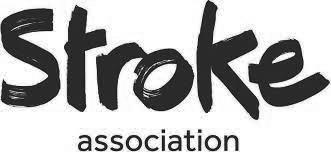
Email: helpline@stroke.org.uk
Supporter Relations 0300 3300 740 Email: supporterrelations@stroke.org.uk www.stroke.org.uk
Tel: 0300 244 4000
Email: ceu@scotland.gsi.gov.uk www.gov.scot
Contact us via our online contact form
www.turn2us.org.uk
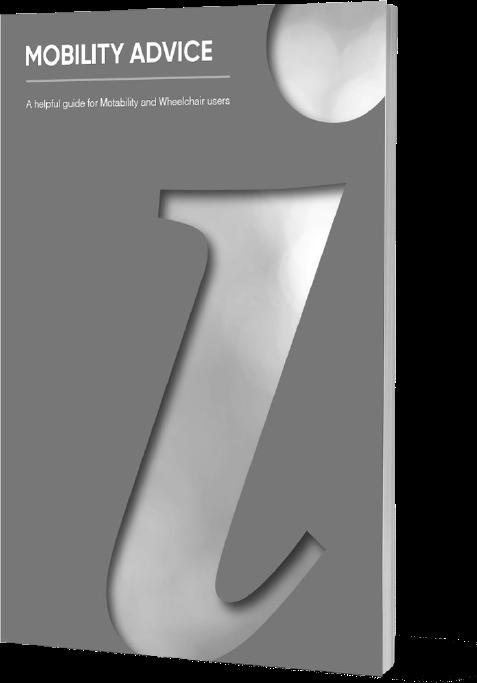
The information provided in this publication is given in good faith and is in no way connected to or affiliated with any of the organisations contained within this publication. The information supplied should not be taken as legal advice.
The content is also not intended to replace other healthcare professional advice that you may be encouraged to seek.
Professional advice should be sought where appropriate. Any rates and information contained within this publication was correct at the time of writing in July 2025.
As benefit entitlements change regularly, you are advised to contact the benefits enquiry line or your local jobcentre plus for information about current entitlements.
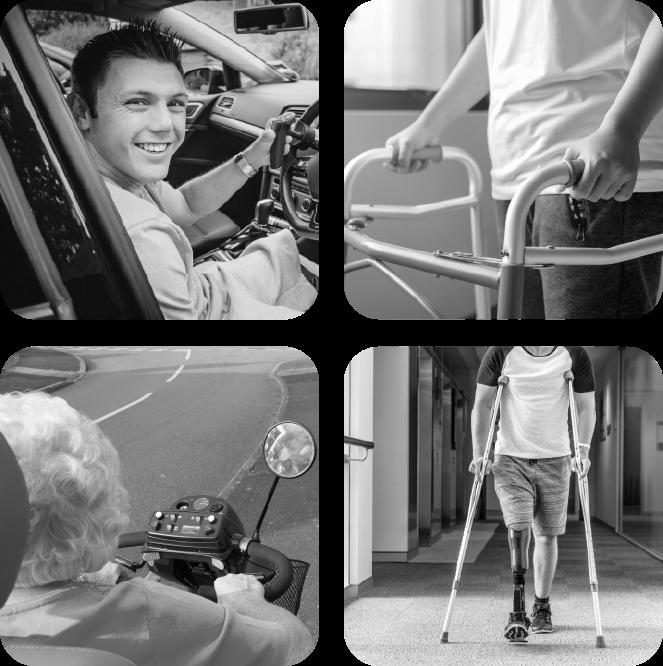
If you have a temporary or permanent disability, this guide is designed to help you discover ways to maintain your independence, improve mobility, and enjoy greater freedom. You can also scan the QR code to visit our website, where you’ll find our extensive list of helpful publications.


Inside Back Cover / Advertising
Outside Back Cover / Advertising